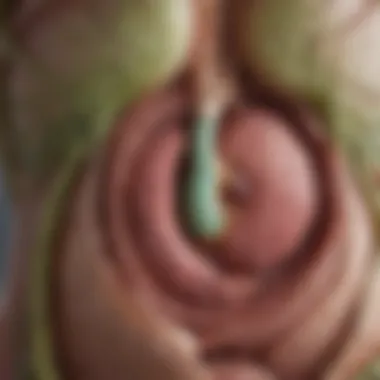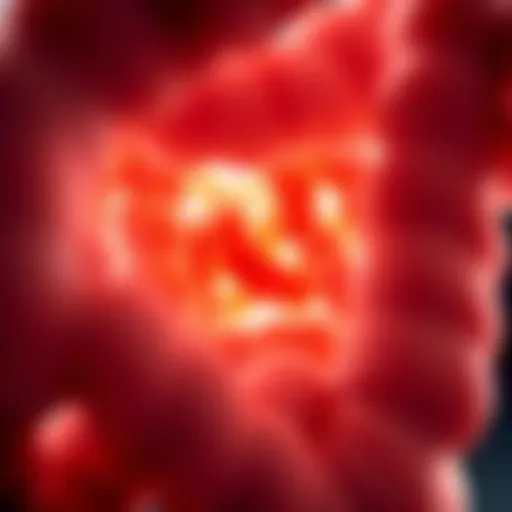Gallbladder Removal: Weight Loss Insights and Implications


Intro
Gallbladder removal, also known as cholecystectomy, has gained attention as a potential avenue for weight loss. The gallbladder plays a role in digestion, particularly in the storage and concentration of bile. Its removal raises questions regarding metabolic changes and the effects on body weight.
In this article, we will dive into the implications of this procedure, examining the surgical techniques, recovery, and the long-term implications for weight management. The complexities surrounding this surgical intervention require thorough discussion to understand its benefits and risks.
Recent Advances
Latest Discoveries
Recent studies underscore noteworthy findings in the context of gallbladder removal and its influence on weight loss. One significant discovery includes the observation that patients who undergo elective cholecystectomy often experience an initial phase of weight loss. This is attributed to dietary adjustments and changes in gallbladder-related hormones.
However, the long-term effects on weight management remain variable. Some research indicates that weight regain can occur, which raises critical questions regarding the sustainability of weight loss post-surgery. Understanding these outcomes helps in considering gallbladder removal primarily as a weight loss strategy.
Technological Innovations
Advancements in minimally invasive surgical techniques have revolutionized gallbladder removal. Laparoscopic procedures have drastically reduced recovery times compared to traditional open surgery. Patients benefit from less postoperative pain and a quicker return to normal activities.
Furthermore, improved imaging technologies, such as high-resolution ultrasounds and MRI, enable better pre-surgical evaluations. These advances allow for more accurate diagnoses and targeted interventions, minimizing complications during surgery.
"Technological innovations in laparoscopic surgery have enhanced patient recovery and outcomes significantly, validating the shift from traditional methods."
Methodology
Research Design
To thoroughly investigate the implications of gallbladder removal for weight loss, a mixed-method research design is employed. This approach integrates both quantitative data from clinical studies and qualitative insights from patient experiences. Analyzing these different types of data offers a comprehensive understanding of the topic.
Data Collection Techniques
Data collection for this analysis includes:
- Clinical trials assessing weight loss outcomes in patients post-cholecystectomy.
- Patient surveys evaluating dietary habits and lifestyle changes following the surgery.
- Longitudinal studies tracking weight management over extended periods.
The combination of these techniques provides a holistic view of how gallbladder removal influences weight loss and fosters informed discussions among researchers, educators, and health professionals.
Prelims to Gallbladder Removal
Gallbladder removal, known medically as cholecystectomy, has garnered significant attention in recent years, especially in discussions surrounding weight loss. Understanding this surgical procedure is crucial because it plays a defining role in how individuals manage their health and weight. This section sets the stage for a detailed exploration of the implications of gallbladder removal on weight and overall physiology.
Why Focus on Gallbladder Removal?
The gallbladder may seem like a minor organ, but its function impacts digestion and metabolism. When this organ is removed, it leads to various physiological changes that can influence weight loss. Such changes can affect bile production and fat digestion, making it essential to grasp the nuances of gallbladder surgery for those considering it.
Additionally, many people express a desire to explore all avenues of weight loss, including surgical options. Therefore, it becomes imperative to evaluate the benefits, risks, and indications of gallbladder removal concerning weight reduction.
The subject also invites a broader discourse regarding surgical interventions compared to lifestyle changes for weight loss. This article will navigate through both the medical and personal implications, offering readers a well-rounded understanding of the topic.
Understanding the Gallbladder's Role
The gallbladder is a small pouch located beneath the liver. Its primary purpose is to store bile, which is produced by the liver and plays a critical role in the digestion of fats. Bile helps emulsify fats, making them easier for the body to absorb during meals.
When food containing fat enters the digestive system, the gallbladder contracts, releasing bile into the small intestine. This process enhances the breakdown and absorption of nutrients. Any disruption to this function can lead to digestive complications.
In cases of gallbladder disease, such as cholecystitis or biliary colic, removal of the organ can become necessary. However, potential patients must be aware that the absence of the gallbladder leads to direct alterations in digestion, as bile continuously flows into the intestine instead of being stored.
Indications for Gallbladder Surgery
Despite its vital role, there are specific circumstances under which gallbladder removal is recommended. These indications include:
- Gallstones: The most common reason for surgery. These hard deposits can cause pain, inflammation, or infection.
- Cholecystitis: Inflammation of the gallbladder, leading to severe pain and potential complications.
- Biliary Dyskinesia: A condition where the gallbladder does not function properly, causing recurring pain.
Surgical intervention becomes critical when these conditions pose a threat to health or quality of life. Understanding these indications can aid individuals in making informed decisions regarding gallbladder removal and its connection to weight management.
"Understanding when surgery is necessary is key to a successful outcome."
The Relationship Between Weight Loss and Gallbladder Surgery
Exploring the relationship between gallbladder surgery and weight loss is critical for understanding the broader context of this medical procedure. Gallbladder removal, or cholecystectomy, is often performed for various reasons, including gallstones and chronic inflammation. However, the implications of such surgery extend beyond immediate digestive health and into the realm of weight management.
Patients often wonder whether removing the gallbladder can assist in their weight loss journey. On one hand, anecdotal evidence suggests that some individuals experience a shift in weight following surgery. Conversely, healthcare professionals are cautious to attribute weight loss directly to the surgery. Rather, it is the associated changes in digestion and metabolism that may play a role. Understanding these nuances is vital for anyone considering gallbladder removal as a weight loss strategy.
Popular Theories on Weight Loss Post-Surgery
Several theories attempt to explain why some individuals lose weight after undergoing gallbladder removal. One predominant theory centers on the body's adaptation to changes in bile production. After removal, bile continuously drips into the intestines rather than being stored in the gallbladder. This alteration can lead to less efficient fat digestion initially. As a result, some individuals may experience temporary weight loss due to less caloric absorption.
Another notable theory suggests that the absence of the gallbladder leads to alterations in dietary habits. Post-surgery, patients may naturally adopt a healthier lifestyle. They often heed medical advice, adjusting their diets to avoid fatty foods that were problematic prior to surgery. These conscious dietary modifications can further contribute to weight loss.


Research studies have shown varied results regarding weight change after gallbladder surgery. Some findings suggest minor weight loss occurs, but significant and sustainable weight reduction is unlikely without additional lifestyle interventions. Overall, it is essential to recognize that these theories highlight possible connections but do not establish direct causation.
Nutritional Factors Post-Gallbladder Removal
Diet plays a crucial role in the lives of those who have had their gallbladders removed. While some experience digestive changes, adjusting dietary habits can optimize health outcomes. Post-operative nutrition can be categorized into recommended dietary adjustments and foods to limit.
Recommended Dietary Adjustments:
- Increase fiber intake: Whole grains, fruits, and vegetables can promote better digestion and regularity.
- Smaller, more frequent meals: This approach aids in digestion by reducing the burden on the gastrointestinal tract.
- Incorporate healthy fats: Opt for sources such as avocados, nuts, and olive oil, consumed in moderation.
Foods to Limit or Avoid:
- High-fat foods: Fried items and heavy creams can be harder to digest and lead to discomfort.
- Spicy foods: Some may find that spices trigger gastrointestinal distress.
- Dairy products: After surgery, some individuals experience lactose intolerance, necessitating a reduction in dairy consumption.
Maintaining proper nutrition after gallbladder removal is essential, both for managing digestion and for overall well-being. Consulting with a healthcare professional or a registered dietitian can help tailor dietary plans to meet individual needs.
It is important to remember that while gallbladder removal can influence weight, effective weight management ultimately relies on comprehensive lifestyle changes.
Surgical Techniques for Gallbladder Removal
Understanding the surgical techniques for gallbladder removal is crucial because they significantly impact patient recovery and overall outcomes. There are two main types of procedures: laparoscopic cholecystectomy and open cholecystectomy. Each method comes with its own set of benefits, considerations, and potential complications. Both approaches aim to alleviate gallbladder-related issues, but their nuances can make a difference in the patient’s experience.
Laparoscopic Cholecystectomy: A Standard Procedure
Laparoscopic cholecystectomy is often considered the gold standard for gallbladder removal. This minimally invasive procedure uses several small incisions and a camera to guide the surgeon's tools. The primary benefit of this technique is reduced recovery time compared to open surgery. Generally, patients experience less postoperative pain and shorter hospital stays.
Moving through the steps of the operation, the surgeon inflates the abdominal cavity with carbon dioxide gas to create space for movements. This allows for manipulation of instruments without making large incisions. The gallbladder is then removed through one of the incisions.
Postoperative recovery is remarkable for most patients. They can often return to daily activities within a week, contrasting sharply with the longer recovery times required after open surgery.
"Laparoscopic cholecystectomy minimizes recovery time and postoperative pain, making it the preferred choice for many surgeons and patients."
However, it is important to note that not all patients are suitable candidates for laparoscopic surgery. Factors such as obesity, previous abdominal surgeries, or suspected complications may require an open approach.
Open Cholecystectomy: Indications and Outcomes
Open cholecystectomy is a more invasive surgical method that involves a larger incision in the abdominal area. This technique is generally used in cases where laparoscopic surgery is not viable, such as severe inflammation, infection, or other anatomical considerations. While open cholecystectomy has a longer recovery time, it allows for better visualization of the organs in complex situations.
The surgery typically requires a hospital stay of several days, and patients may experience more pain and need a longer period before resuming normal activities. Despite this, open cholecystectomy can effectively treat complicated gallbladder conditions and is sometimes necessary for patient safety.
In summary, both laparoscopic and open cholecystectomy techniques have specific indications based on individual patient circumstances. While laparoscopic surgery is favored for its advantages, surgeons rely on their clinical judgement to decide the most appropriate method for gallbladder removal.
Physiological Changes After Gallbladder Removal
The removal of the gallbladder is a significant surgical intervention that can lead to various physiological changes within the body. Understanding these changes is essential for individuals considering gallbladder removal as a weight loss strategy. The gallbladder plays a crucial role in the digestion of fats by storing bile produced by the liver. When it is removed, the dynamics of bile production and digestion alter, influencing both short-term and long-term health outcomes.
Bile Production and Digestion
Following gallbladder removal, bile produced by the liver no longer has a storage site. Instead of being released in a concentrated form, bile flows continuously into the small intestine. This can result in several implications:
- Digestive Efficiency: The lack of concentrated bile may lead to inefficient fat digestion. Individuals may find it challenging to digest high-fat meals, resulting in symptoms such as diarrhea or bloating.
- Nutrient Absorption: Bile is vital for the absorption of fat-soluble vitamins A, D, E, and K. After surgery, the body’s ability to absorb these nutrients can decline, demanding dietary adjustments to mitigate deficiencies.
- Digestive Adaptation: Over time, the body may adapt to this new flow of bile. Many individuals report an improvement in digestive symptoms as their bodies adjust to the absence of the gallbladder.
Despite these challenges, it’s often possible to maintain a balanced diet, which can support recovery and health.
Impact on Metabolism
Gallbladder removal can also have implications for metabolism, which is a key consideration for anyone looking to achieve weight loss. The impact on metabolic processes may include:
- Diabetes Risk: Some studies suggest an association between gallbladder removal and an increased risk of developing diabetes. The exact mechanisms behind this are still being researched, but it emphasizes the importance of metabolic health following surgery.
- Weight Management: Patients may experience weight loss post-surgery due to dietary changes forced by digestive issues. However, others may find it difficult to maintain a healthy weight if they do not adapt their eating habits accordingly.
- Caloric Intake: The necessity to limit high-fat foods can lead to changes in caloric intake. People might shift to healthier alternatives but could also risk under-eating, affecting energy levels and overall well-being.
"Postoperative dietary management is essential for ensuring metabolic health after gallbladder removal."
In summary, the physiological alterations following gallbladder removal encompass increased bile flow, changes in digestion, and potential modifications in metabolism. Awareness and adjustment are crucial for individuals in navigating these changes effectively to achieve their weight loss and health goals.
Understanding Postoperative Complications
Understanding the postoperative complications after gallbladder removal is crucial for anyone considering this surgery, especially for those looking to lose weight. The gallbladder, while not essential for survival, plays a role in digestion. Its removal can lead to various complications, which need careful consideration.
This section highlights the importance of recognizing these complications. It is vital for patients to be informed about what to expect during the recovery phase. By understanding potential issues, patients can better navigate their postoperative care and consult with healthcare professionals effectively.
Monitoring one’s condition and adapting lifestyle choices based on these complications can significantly impact recovery and overall health. Therefore, a focus on postoperative complications becomes essential not only for immediate recovery but also for long-term health outcomes.
Common Complications and Their Management
Postoperative complications can vary, but some are more frequently seen in patients after gallbladder removal. These include:
- Bile Duct Injury: This is a serious complication where the bile ducts may be accidentally damaged during surgery. It can lead to bile leakage, which requires further intervention.
- Infection: Surgical sites can become infected, leading to increased pain and potentially serious health risks. Patients are encouraged to monitor for signs of infection and seek timely treatment if needed.
- Digestive Problems: Many individuals experience changes in digestion after the gallbladder is removed. Symptoms can include diarrhea, bloating, or abdominal cramping. Dietary adjustments often help manage these changes.
- Cholecystitis: In rare cases, the remaining anatomical structures can become inflamed, leading to discomfort.


Management of these complications often involves:
- Regular Checkups: Continuous follow-up with healthcare providers is necessary to address any emerging issues.
- Medication: Prescribed antibiotics or medications that help with digestion may be indicated.
- Dietary Changes: Adjusting one's diet to include smaller, more frequent meals can ease digestive issues.
"Understanding and recognizing complications early can significantly improve recovery outcomes after gallbladder removal."
Long-term Health Implications
Long-term health implications following gallbladder removal can be profound. While many patients may adjust well, others might experience issues that affect their quality of life.
Some potential long-term effects include:
- Chronic Diarrhea: This could become a persistent issue for some individuals, leading to dietary restrictions and lifestyle changes.
- Fat Malabsorption: The absence of the gallbladder can impair digestion of fats, causing nutrients to not be properly absorbed. This can lead to nutritional deficiencies.
- Risk of Obesity: Although gallbladder removal can lead to initial weight loss, some studies suggest that patients might regain weight later if lifestyle changes are not maintained.
- Increased Risk of Metabolic syndrome: Studies indicate possible correlations between gallbladder removal and higher rates of metabolic syndrome and related disorders.
Addressing these long-term implications requires a proactive approach. Patients should engage in:
- Routine Health Assessments: Regular visits to healthcare professional can help in monitoring and addressing any such issues early.
- Nutritional Counseling: Consultations with a dietitian can assist in optimizing the diet for better health outcomes post-surgery.
- Lifestyle Changes: Incorporating regular physical activity and healthy eating habits can counteract some risks of obesity and metabolic concerns.
In summary, understanding postoperative complications is an essential part of the journey following gallbladder removal for weight loss. Being informed helps patients manage their recovery while also preparing for any long-term health consequences.
Dietary Considerations Post-Gallbladder Surgery
Dietary considerations after gallbladder removal are crucial for the recovery process and ongoing health. The gallbladder plays an important role in digestion, specifically in the storage and release of bile. Bile aids in breaking down fats and absorbing fat-soluble vitamins. Post-surgery, the body adapts to changes in digestion. Understanding these changes supports better dietary choices and overall well-being.
After gallbladder surgery, significant adjustments in diet are often necessary to mitigate potential complications and to promote optimal digestion and nutrient absorption. Individuals without a gallbladder may experience discomfort when consuming high-fat foods, making dietary management an essential part of this transition.
Recommended Dietary Adjustments
- Focus on Low-Fat Diet: It is advisable to adopt a low-fat diet after gallbladder removal. Limiting dietary fats can help in managing digestive symptoms that may arise due to decreased bile storage.
- Eat Smaller Meals More Frequently: Splitting meals into smaller portions throughout the day can ease the digestive burden, providing a steady release of bile and minimizing discomfort.
- Incorporate High-Fiber Foods: Foods rich in fiber can assist digestion and promote regular bowel movements. Whole grains, fruits, and vegetables should be included in the daily diet.
- Stay Hydrated: Adequate fluid intake is necessary for digestion and helps in bowel regulation, especially when adjusting to a new diet.
- Seek Professional Guidance: Consulting a dietitian can provide personalized dietary plans that cater to individual needs and health conditions, ensuring nutrition is met without triggering digestive issues.
Foods to Limit or Avoid
Certain foods may be problematic after gallbladder surgery and should be approached with caution. Here are some foods to limit or avoid:
- Fatty Foods: High-fat meats, fried foods, and creamy sauces are often hard to digest without a gallbladder.
- Spicy Foods: These may irritate the digestive tract and should be limited in the early post-operative phase.
- Dairy Products: Full-fat dairy can cause discomfort. Low-fat or lactose-free alternatives may be better tolerated.
- Processed Foods: Items high in preservatives and unhealthy fats can disrupt digestion, so it's best to avoid these.
- Caffeinated Beverages: Caffeine can stimulate the digestive system excessively, leading to discomfort.
Important Note: Each person reacts differently to the absence of a gallbladder. Keeping a food diary can help identify triggers and establish a balanced diet.
In summary, dietary considerations post-gallbladder surgery play a vital role in recovery and long-term health. By understanding the necessary adjustments and making informed food choices, individuals can significantly improve their quality of life and manage their weight effectively.
Medical Perspectives on Gallbladder Removal for Weight Loss
Understanding the medical perspectives on gallbladder removal for weight loss is crucial for making informed decisions. Many patients consider this surgery due to its potential impact on weight management. However, medical professionals emphasize that such a procedure should not be viewed as a primary weight loss solution. Instead, it is often a necessary intervention for other health issues, such as gallstones or gallbladder inflammation.
Expert Opinions on Effectiveness
Physicians have varied opinions regarding the effectiveness of gallbladder removal as a weight loss method. Some experts argue that the surgery can lead to incremental weight loss post-operation due to the removal of the gallbladder, which plays a role in fat digestion. However, this weight loss is often minor and may not be sustained over a long period.
Additionally, many medical professionals emphasize that the primary goal of gallbladder removal is to address pathological conditions rather than achieve weight reduction. A review of clinical guidelines suggests that patients should approach this surgery with realistic expectations regarding weight outcomes.
"Gallbladder removal should not be your first step toward weight loss," says Dr. Mary Johnson, a surgeon specializing in bariatric procedures. "The surgery effectively treats specific gallbladder conditions, but it is not an obesity cure."
Research Evidence Supporting Weight Loss Claims
Current research provides mixed evidence regarding weight loss following gallbladder removal. Some studies indicate a short-term reduction in weight, often attributed to dietary changes and altered eating patterns post-surgery. A 2019 study published in the Journal of Gastrointestinal Surgery showed that patients lost an average of 5-10% of their body weight intra-post surgery.
However, it is essential to recognize long-term outcomes. Other studies emphasize that weight loss may plateau over time and urge patients to focus more on traditional weight management strategies such as diet and exercise. Key findings include:
- Metabolic Changes: The removal can lead to changes in metabolism that may influence weight.
- Nutritional Deficiencies: Some patients experience nutrient malabsorption, requiring careful dietary monitoring.
- Individual Variation: Weight loss results can differ significantly among individuals, making it challenging to generalize.
In summary, while there may be some weight loss benefits associated with gallbladder removal, it should not be the primary reason for opting for the surgery. A comprehensive approach, focusing on overall health and well-being, is the most effective strategy for long-term weight management.
Psychological Aspects Post-Surgery
Understanding the psychological aspects after gallbladder removal is essential for anyone considering surgery. The mental health implications can be profound, influencing recovery and overall well-being. Patients often experience changes in mood, anxiety levels, and even their relationship with food. These changes require careful consideration and management for better outcomes.
Mental Health Considerations
Gallbladder surgery may seem straightforward, but the mental ramifications can be significant. Many individuals report feelings of anxiety regarding their diet choices or fear of complications. This situation can be exacerbated by pre-existing conditions like depression or anxiety disorders.
It is important for healthcare providers to assess the mental health of patients both pre and post-surgery. Support groups are one way to address these mental health challenges. They provide a platform for patients to share experiences, reducing feelings of isolation. Additionally, counseling or therapy might be advised. For some patients, cognitive-behavioral therapy has proven effective in managing post-surgical anxiety.
Some factors affecting mental health after gallbladder removal include:
- Changes in Dietary Habits: Adjusting to new eating habits can create stress. Many individuals worry about how food will affect their recovery.
- Fear of Recurrent Symptoms: Some patients may have lingering fears about experiencing pain or other symptoms, causing anxiety.
- Lack of Support: Patients without family or friend support might struggle more intensely with these issues.


Body Image and Self-Perception
Another significant aspect to consider is body image and how individuals perceive themselves after surgery. Weight loss can be a goal, but it may not happen immediately after gallbladder removal. This can lead to frustration or disappointment.
The surgery itself may alter the way some patients view their bodies. They might feel relief from previous discomfort but could also feel insecure about their appearance. Changes in weight and body shape can lead to a negative self-image.
Body image issues can manifest as:
- Comparisons with Others: Patients may find themselves comparing their body changes to those of peers or even social media influencers.
- Reduced Self-Esteem: If weight loss does not occur as expected, this can lead to feelings of inadequacy or low self-worth.
- Social Withdrawal: Negative body image may prompt some individuals to withdraw from social settings. Fear of judgment can keep them from engaging with friends and family.
Addressing these concerns early can be vital. Health professionals should encourage discussions about body image and self-acceptance with their patients. Promoting a positive outlook can foster resilience, ultimately aiding in recovery.
Alternative Weight Loss Strategies
Choosing appropriate weight loss strategies is crucial for individuals seeking to improve their health and achieve long-term weight management. This section examines various methods that can serve as alternatives to surgical interventions such as gallbladder removal. With multiple options available, a comprehensive understanding of these strategies helps readers make informed decisions regarding their weight loss journey.
Lifestyle Modifications for Effective Weight Management
Lifestyle modifications are fundamental for sustainable weight loss. These changes focus on establishing healthier habits that promote not only weight reduction but also improved overall well-being. The following aspects are essential:
- Balanced Diet: Consuming a variety of foods ensures adequate nutrient intake while managing caloric consumption. A diet rich in fruits, vegetables, lean proteins, and whole grains can support weight loss effectively.
- Regular Physical Activity: Integrating exercise into daily routines helps burn calories and boosts metabolism. Activities such as walking, cycling, and strength training contribute to weight management and enhance cardiovascular health.
- Behavioral Changes: Recognizing emotional triggers and learning to manage stress can reduce mindless eating. Techniques such as mindfulness, cognitive behavioral therapy, and journaling can assist individuals in making healthier choices.
- Sleep Quality: Prioritizing adequate sleep is often overlooked, yet research suggests a link between poor sleep and weight gain. Establishing a regular sleep schedule can benefit both mental and physical health, aiding weight loss efforts.
"Long-lasting weight loss is less about short-term dieting and more about adopting a sustainable lifestyle."
Non-Surgical Options Available
Several non-surgical alternatives for weight loss can be explored. These methods range from pharmacological solutions to behavioral therapies and can be tailored to individual needs:
- Medication: Various weight-loss medications are approved by healthcare authorities. These drugs can suppress appetite or reduce fat absorption, aiding in weight control when used alongside lifestyle changes.
- Nutritional Counseling: Engaging with dietitians provides personalized meal plans and guidance to navigate dietary choices effectively. Professional support can help individuals understand their eating patterns and make sustainable changes.
- Weight Loss Programs: Programs like Weight Watchers or Jenny Craig offer structured accountability and resources for those wishing to lose weight. Such programs often provide community support, which can enhance motivation.
- Mindfulness-Based Weight Loss: Incorporating mindfulness practices can lead to better eating habits. Techniques such as mindful eating focus on savoring food and recognizing hunger and satiety signals, ultimately promoting a healthier relationship with food.
Comparative Analysis with Other Surgical Weight Loss Methods
Understanding the role of gallbladder removal in the context of weight loss involves a careful analysis of how this procedure compares with other surgical methods explicitly designed for weight management. This section delves into the distinctions and similarities between gallbladder removal and bariatric surgery, highlighting the effectiveness, risks, and benefits inherent in each approach.
Bariatric Surgery versus Gallbladder Removal
Bariatric surgery encompasses a variety of procedures intended to assist with significant weight loss. Techniques such as gastric bypass and sleeve gastrectomy alter the gastrointestinal tract to limit food intake and calorie absorption. These methods are usually employed for patients with a body mass index (BMI) over 40 or those with obesity-related health complications.
Contrarily, gallbladder removal, known medically as cholecystectomy, is not primarily a weight loss surgery. Instead, it addresses gallstones and the complications resulting from gallbladder dysfunction. However, some patients report weight changes post-surgery, possibly due to alterations in digestion and metabolism. The relationship between gallbladder removal and weight loss is often indirect, whereas bariatric surgery aims specifically at obesity treatment.
Key differences between these two approaches include:
- Procedure Goal: Bariatric surgery directly targets weight loss. Gallbladder removal is a treatment for gallbladder disease.
- Mechanism of Action: Bariatric surgery reduces stomach size or alters intestinal pathways, leading to reduced calorie intake. Gallbladder removal changes how bile is released into the intestines but does not limit food intake directly.
- Patient Profile: Bariatric surgery is typically recommended for those with severe obesity. Gallbladder removal can apply to a broader patient base.
Risks and Benefits of Each Approach
Both surgical interventions come with their own set of risks and benefits, making it crucial for patients to consider their options carefully.
Bariatric Surgery:
- Benefits:
- Risks:
- Significant, sustained weight loss.
- Improvement or resolution of obesity-related conditions (e.g., type 2 diabetes, hypertension).
- Enhanced quality of life in many cases.
- Surgical complications, such as infection and bleeding.
- Nutritional deficiencies due to malabsorption.
- Dumping syndrome and other digestive issues.
Gallbladder Removal:
- Benefits:
- Risks:
- Alleviation of symptoms related to gallbladder disease.
- Potential weight loss for some patients due to changes in digestion.
- Postoperative complications, including bile duct injury.
- Digestive issues, such as diarrhea or fat malabsorption may occur.
- Long-term changes in metabolic function, although this varies by individual.
In summary, the comparative analysis reveals that while gallbladder removal may have incidental effects on weight, bariatric surgery remains the more effective option for those explicitly seeking weight loss. Thus, it is imperative for individuals contemplating these surgical options to consult healthcare providers and thoroughly discuss their personal health conditions and objectives.
Ending: Gallbladder Removal in Context
The conclusion of this article synthesizes the multifaceted aspects of gallbladder removal as a weight-loss strategy. It serves as a critical juncture, emphasizing the need to evaluate the surgery not solely based on its potential for weight reduction but also by considering the broader implications on health. Understanding the complex relationship between gallbladder removal and weight loss can assist patients in making informed decisions about their health and well-being.
Summary of Key Insights
In the preceding sections, various key insights have been discussed regarding gallbladder removal for weight loss. These include:
- The gallbladder plays a significant yet often misunderstood role in the digestive system, specifically in bile storage and release.
- Weight loss following the removal of the gallbladder may occur, but is often linked to a variety of factors including dietary changes, metabolism alterations, and individual physiological differences.
- Different surgical techniques, such as laparoscopic and open cholecystectomy, carry varying implications for recovery and long-term health.
- Postoperative complications can arise, requiring careful management to ensure optimal health outcomes.
- The psychological effects following surgery should not be overlooked, including mental health and body image considerations.
- There is a necessity for alternative weight loss methods and lifestyle changes that can support individuals who opt for surgery.
These insights underscore the importance of understanding the implications of gallbladder removal within the larger context of health and weight management.
Final Thoughts on Its Role in Weight Loss
Ultimately, gallbladder removal may offer a pathway for weight management for some individuals, but it should not be viewed as a standalone solution. The decision to undergo this surgery involves a balance of benefits and risks, necessitating an informed discussion with healthcare providers. Patients should consider the potential for weight loss alongside the importance of maintaining a healthy lifestyle post-surgery.
Expert opinions and research indicate that while some may experience significant weight loss after the procedure, others may not notice a dramatic difference. Therefore, it is essential to approach gallbladder removal as part of a comprehensive weight loss strategy that includes diet, exercise, and psychological support.















